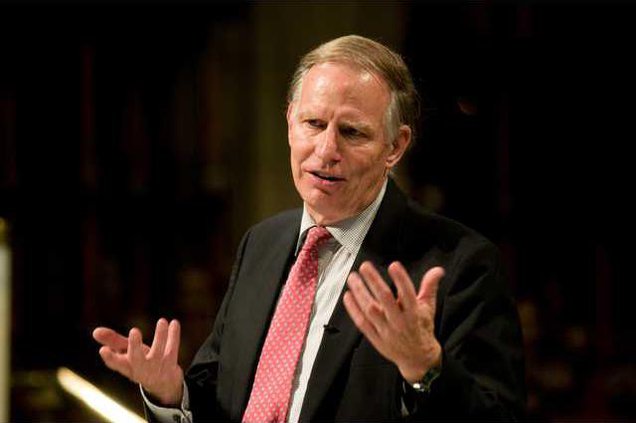Writing a book about the inventor of the microchip led to a lifelong friendship between 2000 Nobel Prize winner Jack Kilby and journalist T.R. Reid. When a sculpture honoring Kilby is unveiled on April 28 in downtown Great Bend, Reid will attend the 7:30 p.m. ceremony.
“I’m looking forward to seeing the memorial and seeing everybody in Great Bend,” said Reid, who moved to Denver in 2003, after serving overseas for many years as a Washington Post bureau chief. “I think it’s wonderful that Great Bend understands what Jack Kilby achieved, and I think it’s marvelous the way a community in the heart of Kansas has grabbed on to the legacy of their favorite son.”
Reid last visited Great Bend in October 2001, while serving as London bureau chief for the Washington Post. He participated in Jack Kilby Weekend, and released an updated version of his 1984 book about Kilby titled, “The Chip: How Two Americans Invented the Microchip and Launched a Revolution.” The book follows the independent paths Kilby and Robert Noyce took to create the integrated circuit. Kilby’s invention was six months ahead of Noyce, but Noyce’s version differently connected the parts. Texas Instruments and Fairchild Semiconductor Corp. battled for licensing rights through the 1960s before agreeing to cross-license their technologies.
“One thing my book did was to convey the sense that these guys were joint inventors,” explained Reid. “They got the same idea separately at about the same time. Neither of them cared about who was first; they were simply solving a problem, as engineers do. I think today both TI and Intel (the company Noyce founded in 1968) recognize both men as co-inventors.”
Following publication of “The Chip” in 1984, Reid kept in contact with both men, until each of their deaths. Reid especially developed a close relationship with Kilby and his family. As he explained it, Kilby was “like a friendly old uncle,” even though Reid made sure his three children understood Kilby’s importance as “one of the most important Americans of the century.” But Reid noted that Kilby never presented himself in such an important way. He wasn’t interested in gaining celebrity status or in winning awards.
“What drove him was solving problems,” said Reid. “He was aware that he had solved the most important electrical engineering problem of the 20th century and I think he was comfortable with that. He liked that.”
Reid continues to undertake global topics and projects as a writer, commentator and documentary film correspondent. He has written nine books in English and three in Japanese, and he is a frequent guest for National Public Radio’s Morning Edition. He he has made documentary films for National Geographic Television, PBS and the A&E Network. His work sometimes takes him away from home for weeks and months at a time. Still, he finds time where there’s opportunity to tout the accomplishments of his friend who changed the world. Reid does it, he said, because Kilby’s story is one that has the capability to inspire new generations.
“It’s obvious that Jack got a fabulous basis of science from Great Bend High School in the 1930s and 40s,” said Reid. “He couldn’t have done what he did later if he did not have that educational basis. He came out of a community that cared about educating its kids. The beauty of building a memorial to Jack Kilby in Great Bend is to remind the community that our kids have the opportunity to do great things if we give them a decent education now. That message can be applied everywhere in America.”
Noted author T.R. Reid plans Great Bend visit to honor Kilby





